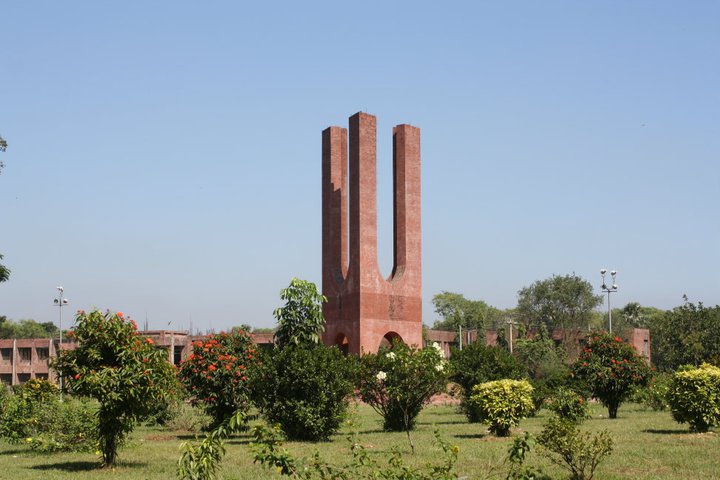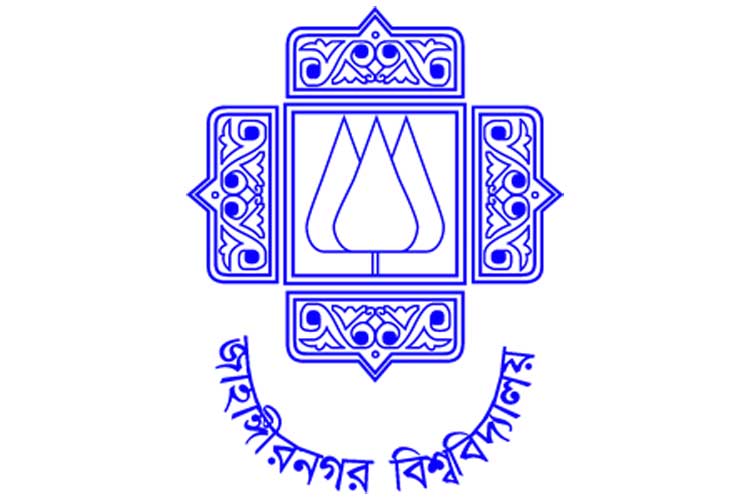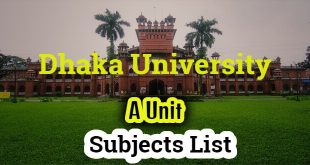Jahangirnagar University is one of the 4 Public Universities in Bangladesh. It was formally launched on 12 January 1971 under the Jahangirnagar Muslim University Ordinance. Jahangirnagar University is a residential university spread over an area of 697.56 acres (2.8 km2) designed by architect Robiul Hossain. It is considered as one of the most beautifully designed universities of Bangladesh. There are 34 departments under six faculties. Here we are going to deliberate about Jahangirnagar University B Unit Admission Test Circular 2020-21. The faculty name is Social Science Faculty.

Post Contents
JU B Unit Admission Circular 2020-21
The official page of the university has already published Jahangirnagar Admission Test Circular 2020-21. Jahangirnagar varsity admission will start on the next 23rd of January 2020. The awakened candidates will have to apply in Jahangirnagar University Admission Test Notice 2020-21 online. The application procedure must be done by the given time. Here is the chart of the Online Application Date.
Online Application Date :
| Online Application Date Start: | 08 January 2021 |
| Online Application Date Finish: | 31 January 2021 11:59 PM |
Following the previous sessions dictum, 2nd timers can apply for the JU Admission 2020-21 session. The authority has already announced the starting date of admission. Here are the Admission Date and Time Table for the candidates.
Admission Test Date:
| Admission Date Start : | 01 February 2021 |
| Admission Date Finish : | 15 February 2021 |
Jahangirnagar University Previous Year Admission Circular:-
JU Admission Circular 2020-21
Interested candidates must fill-up the admission form online timely. There is also a payment method for each unit. Here is the form price table.
Form Price:
| Unit Name | Form Price |
|---|---|
| A,B,C,D,E | 600 TAKA |
| C1, F, G, H, I | 400 TAKA |

Jahangirnagar University Admission Method
Jahangirnagar Admission process has been elaborately disposed of on the official page of JU ( https://ju-admission.org/ ).



JU B Unit Admission Requirements
SSC/Equivalent Pass: 2016 or later
HSC / Equivalent pass: 2018 or 2019
Educational Requirement:
- Candidates have to pass SSC and HSC with a GPA of 3.5 in each.
-
Departments Group wise GPA requirements(HSC) Subject wise GPA requirements Economics A)Group: Science Total GPA: 8.00 B)Group: Humanities/Business Study/others Total GPA: 7.50 A)English and Maths( A-) B) Bangla and English(A-) Geography & Environment A)Group: Science/Agriculture Total GPA: 7.50 B)Group: Humanities/Business Study/others Total GPA: 7.00 A)Bangla/English(B) B) Bangla/English(B) Government & Politics A)Group: Science/Agriculture Total GPA:8.00 B)Group: Humanities/Business Study/others Total GPA: 7.00 A)Bangla(A-) and English(B) B) Bangla(A-) and English(B) Anthropology A)Group: Science/Agriculture Total GPA: 8.00 B)Group: Humanities/Business Study/others Total GPA: 7.50 A)Bangla and English(A-) B) Bangla and English(A-) Urban & Regional Planning A)Group: Science/Agriculture Total GPA: 8.00 B)Group: Humanities/Business Study/others Total GPA: 7.50 A)Maths and English(A-) B)Maths and English(A-) Public Administration A)Group: Science Total GPA: 8.00 B)Group: Humanities/Business Study/others Total GPA: 7.50 A)English(A-) B)English(A-)

JU B Unit Marks Distribution And Prospectus
| Total Marks: | 100 |
| Admission Test: | 80 marks |
| SSC and HSC Result: | 20 marks |
| Time: | 55 minutes |
GPA 20 Marks:
(HSC GPA x 2.5 ) + ( SSC GPA x 1.5 ) = .20
Admission Test:
| Subjects | Numbers |
|---|---|
| Bangla | 10 |
| English | 15 |
| Maths | 15 |
| General Knowledge | 25 |
| IQ | 15 |
| Total number: | 80 |
Question Pattern: MCQ
Mark reduction for each wrong answer: 0.2
Pass Marks: 27
**Students are not allowed to use any device like Mobile phone, Calculator, Electric watch or any Electric devices, Papers( without admit card) in the exam hall**
There will be a wall clock in the exam hall for the examinee and students.
Jahangirnagar University B Unit(Social Science) Subject Lists
There are six departments under the Social Science faculty. Here are the departments with descriptions.
- Economics
- Geography and Environment
- Government and Politics
- Anthropology
- Urban and Region planning
- Public Administration
……….. …………
- Economics: The description is coming soon. Sorry for the inconvenience.
- Urban and Region Planning: The Department of Urban and Regional Planning was established in 1999 under the Faculty of Social Science with a four year long Bachelor in Urban and Regional Planning (BURP) program. The first batch had a class size of 20. The department of URP now offers BURP, MURP, MPhil, and Ph.D. program. Currently, the department has more than 200 regular students with 20 faculties and seven support staff.
- Anthropology: The department established in 1985. This department has been offering a four-year undergraduate program, one year Masters program, and M.Phil., Ph.D. program. Now the total number of students in undergraduate is 253 and Masters is 77. Furthermore, 17 M.Phil researchers and 23 Ph.D. researchers are currently enrolled in the department. 18 batch so has been finished the Master’s program, and the total number of students passed is 1011. The names of faculties are twenty-four. Among them 11 are professors, 6 are associate professors, 3 are assistant professors and 4 are lecturers. However, five are on leave and pursuing their higher degrees. The entire office staffs are 7. Among them 2 are administrative officers, 1 is seminar librarian, 1 is computer lab assistant, and 3 are messengers. The seminar library has rich in collection of books; more than 12000 books are there. It consists of a computer to find the digital catalog of the library. The computer lab has 20 updated computer facilities with internet connections. Classrooms are equipped with modern multimedia facilities, and one class is organized for extensive group discussion facilities.
- Furthermore, two small rooms are equipped for little group discussion and for organizing small seminars. Besides, students have a place to host group discussions among themselves. Department is known for a student-friendly academic environment.
- Geography and Environment: A description is coming soon. Sorry for the inconvenience.
5. Government and Politics: Initially in 1972, the courses in Politics were offered at the secondary level for the subsidiary students of Economics, Geography, History, Bangla, and English. The Department of Government and Politics formally came into being in 1976 with only two faculties. Now it has turned into 21 faculty members in number. The department offers undergraduate, Masters, M.Phil, and Ph.D. programs. Each year about 65-70 students register in the honors and almost the same name in the Master’s levels. The enrollment of students in the M. Phil and Ph.D. programs ranges from 25-35. The medium of instruction is both Bangla and English. The academic year is July to June. Also, the department introduces a year professional Masters’s program named WMGDS (Weekend Masters of Governance and Development Studies) in 2015. The department organizes lecture discussions and publishes its annual journal called Asian Studies. Besides, there is a yearly journal named ‘Jiggasha’ a dedicated platform for the M.Phil and Ph.D. researchers to make their scholarly contributions. The department also launches CGS (Center for Governance Studies), a research center from the very beginning of 2015. Over the years, the department has been vibrant with the presence of several clubs, i.e. debate club, sports and tours club, cultural club, English language club, and so on. The Alumni Association of the Government and Politics leverages the effort of the welfare of the department. The details of the admission procedures are available on the university website: www.juniv.edu The curricula of the department includes a wide range of fields and are devised to offer a thorough grounding on the discourses of government and politics with scopes for further specialization. The main areas of concentration are political thought, comparative politics, international politics, public policy, governance issues, social anthropology, political analysis, and research methods. The core courses include political theories, and classic concepts of philosophers & political scientists and practical sessions cover Bangladesh politics, political systems, behavior, institutions, processes, and issues from multi-dimensional perspectives. The objective of the course is to provide students with the knowledge, conceptual tools, and understanding of contemporary methods. Students as such, obtain a useful educational background for job opportunities in government organizations, NGOs, research positions, educational institutions, political and civic bodies as well as media. M. Phil and PhD programs are designed to explore and disseminate knowledge and train students in conducting independent research with diverse methodologies and approaches. There are several optional advance (600 level) courses to complement the research interests of post-graduate students. Required seminar presentations of M. Phil and PhD students bring forth the faculties, supervisors, and students to share and expand critical opinions and excellence in higher research.
6. Public Administration: The Department of Public Administration at Jahangirnagar University, since its establishment in the 2006-2007 session, is committed to produce state-of-the-art skills for the government and create indigenous knowledge-based solutions to a host of administrative and policy problems and challenges. The department envisions becoming a regional center of excellence in the system, governance, and regulatory science. The department currently has a 4-year undergraduate program (BSS in Public Administration) and a 1-year Master’s program (Master in Public Administration). M.Phil. And Ph.D. programs are also available in the department. More than 300 students pursue their higher education in Public Administration at a single point in time. The department also has 17 faculty members and five non-academic staff. The head of the department is called the Department Chairman, appointed by the Vice-Chancellor for a period of three years from among the teachers of the department not below the rank of Assistant Professor by rotation in the order of seniority. The Chairman of the Department is responsible for the general supervision of the department and shall dispose of routine matters. All policy matters are dealt with by the Academic Committee. The Academic Committee consists of all teachers of the department and deals with(a) Admission of students; (b) Syllabuses; (c) Examinations; (d) Teaching in the department; (e) Co-curricular activities of the students in the department. Though there is no clearly stated mission of the department, the faculty members incessantly work together to contribute to the public interest through high quality and ethical teaching, research, capacity building, and community service. To this end, we create and pursue opportunities that strengthen and sustain a vibrant intellectual community, centered on the purposeful, critical, and disciplined study of learning and teaching in a range of contexts. Our specific objectives are as follows: 1. Graduating students will have an integrated knowledge of and demonstrated ability to perform as administrative and management professionals. Further, they will be prepared for continued learning throughout their career; 2. Students will have positive perspectives and skills that create products as well as creative leaders, especially in the public and non-profit sectors; and 3. The graduate program faculty will demonstrate excellence in teaching, as well as evidence of meaningful professional and scholarly activities.
JU B Unit Available Seat
Jahangirnagar University B Unit available seats for both males and females are shown here.
| Department | Seat(Male) | Seat(Female) | Total Seat |
|---|---|---|---|
| Economics | 40 | 35 | 75 |
| Geography and Environment | 45 | 25 | 60 |
| Government and Politics | 36 | 29 | 65 |
| Public Administration | 30 | 20 | 50 |
| Urban and Regional Planning | 20 | 15 | 35 |
| Anthropology | 32 | 28 | 60 |
| Total: | 193 | 152 | 345 |
Jahangirnagar University B Unit Result
Jahangirnagar Admission Result will be published by the authority on the official website of JU. Generally, JU authority publishes the result immediately right after the test or take one/two days to announce. Students will get o see all the information in the official website also here we will provide the update.
Click here to get the result:-
Conclusion
Jahangirnagar University B Unit Admission Test Circular 2020-21. For the students who are eager to get a chance in the B unit and wanted to have an idea. Some Information may update in the course of time. Stay connected.




